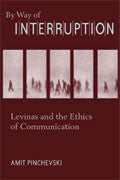By Way of Interruption: Levinas and the Ethics of Communication
Amit Pinchevski $30.00Published in 2005 | 294 pages | paper | ISBN: 978-0-8207-0376-3
Reviews:
“Pinchevski's text is admirable and should provoke a larger and reenergized scholarly discussion about new understandings of the ethics of human communication. Levinas's notions of passivity, the face, and asymmetrical discourse acquire new meaning and resonance in Pinchevski's important contribution and 'interruption' to the fields of communication studies, rhetoric, ethics, and philosophy.” — Choice
“Pinchevski's focus on proximity, contact, and intimacy present interesting possibilities regarding the strange mix of utopian impulses, intimacy, and rebellious disregard for others found in a variety of digital rhetorics.” — H-Net: Humanities and Social Sciences Online
“Pinchevski's book avoids the sort of excessive abstraction typical of Anglo-American philosophy and is admirably tied to very real social and political concerns. It is, after all, first and foremost a work of ethics, one with obvious practical implications. Its style is clear and lively, and cheerfully free of overbearing technical jargon. It is a highly intelligent contribution to the philosophy of communication. . . . It is therefore a warmly recommended book” — Canadian Journal of Communication
“Pinchevski offers a meticulous explication and application of Levinas's notion of the ethical relation in order to spotlight communications' nonhermeneutic, ethical dimension. His book is a welcome addition to rhetorical studies and to communication theory more broadly, one that is well worth the read for anyone concerned with the intersections of communication and ethics. . . . This book is a valuable contribution to communication studies. By Way of Interruption is both provocative and courageous, and it deserves a wide audience.” — Philosophy and Rhetoric
Book Information:
By Way of Interruption presents a radically different way of thinking about communication ethics. While modern communication thought has traditionally viewed successful communication as ethically favorable, Pinchevski proposes the contrary: that ethical communication does not ultimately lie in the successful completion of communication but rather in its interruption; that is, in instances where communication falls short, goes astray, or even fails. Such interruptions, however, do not mark the end of the relationship, but rather its very beginning, for within this interruption communication faces the challenge of alterity. Drawing mainly on the philosophy of Emmanuel Levinas, Pinchevski explores the status of alterity in prevalent communication theories and Levinas's philosophy of language and communication, especially his distinction between the Said and the Saying, and demonstrates the extent to which communication thought and practice have been preoccupied with the former while seeking to excommunicate the latter. With a strong interdisciplinary spirit, this book proposes an intellectual adventure of risk, uncertainty and the possibility of failure in thinking through the ethics of communication as experienced by an encounter with the other.
Author Information:
AMIT PINCHEVSKI is assistant professor in the Department of Communication and Journalism at The Hebrew University of Jerusalem.







